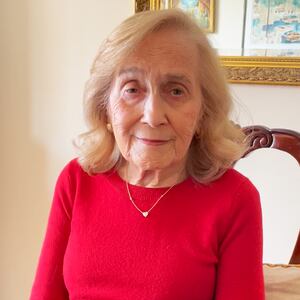Larisa Dzuenko has fled Ukraine twice. The first time, in July 1941, her home in the capital of Kyiv was months away from being occupied by Nazi Germany. Aged just two years old, Dzuenko fled with her Jewish mother through Russia to safety in Uzbekistan. After the end of World War Two2, Dzuenko was able to return home. In March 2022, her security in the Ukrainian capital was once again under a terrifying threat—this time from the country that helped her over 80 years earlier.
Greg Schneider, the executive vice president of the Claims Conference which announced Thursday that Germany will pay another $1.4 billion to Holocaust survivors, told The Daily Beast that Dzuenko was one of a small minority of survivors in Ukraine who decided to flee the current war.
He says around ten percent of the survivors living in Ukraine accepted offers to be evacuated since last year, including some who required medical assistance in order to leave. The remaining 90 percent, however, chose to stay. Schneider says: “What I hear all the time is: ‘When I was a kid, the Nazis drove us from our home—we will never let that happen to us again. If I die, I’m gonna die, but I’m gonna do it in my own home.’”
Dzuenko decided she would not risk her life from the new threat.
In 1941, she was one of an estimated 100,000 Jews who fled Kyiv as the Nazis advanced, with those unable or unwilling to leave left to a terrible fate. Soon after the occupation began in September 1941, almost 34,000 Jews were rounded up and murdered by machine-gun fire over the course of just two days at Babyn Yar, a ravine on the northern edge of Kyiv. The massacres would be the beginning of a systematic slaughter that would see tens of thousands of others killed at the same site and throughout the city before the Nazis finally left.
Speaking to The Daily Beast through a translator from a nursing home in Frankfurt, Dzuenko, now 84, says she can still recall the hardships of her first refuge in Uzbekistan. She and her mother struggled for food and water, and did not know when they would be able to return home—or what would be left of it. When they did arrive back in the ruins of Kyiv after the war, they once again faced a new struggle to rebuild their lives, staying with Dzuenko’s grandmother who had survived the Third Reich’s brutality simply because she was not Jewish. Dzuenko married at 18 and would later have a son and, in time, a grandson.
The peaceful life she made for herself after the horrors of her youth, however, was returned to horror once again last year. As Russian tanks crawled over the border of Ukraine and shelling thundered in Kyiv, Dzuenko faced anew the trauma of being separated from her home. With the help of Jewish organizations, Dzuenko was evacuated in an ambulance on a grueling day-long journey through Poland into Germany, where she still remains today.

Larisa Dzuenko on the day she arrived in Frankfurt from Ukraine.
Rafael HerlichThere, she feels incredibly thankful that some of her essential needs are covered: She has accommodation, access to medical care, and enjoys being taken on excursions. But it’s not her home. She has not seen her 27-year-old grandson, Arthur, since she left. He has remained behind with his mother, Dzuenko’s daughter-in-law. She remains worried about them.
Though nothing can alleviate that particular unbearable burden, she is being helped with others. Dzuenko is one of thousands of survivors around the world who has received funding from the German state which, as a result of negotiations with the Claims Conference, financially supports the living victims of the Holocaust.
On Thursday, the Claims Conference announced that its latest annual talks with the German government had resulted in approximately $1.4 billion worth of new compensation and social welfare services for Holocaust survivors around the world. Of that, $888.9 million will be provided for home care services in 2024—including an extra $105.2 million to address the increased needs of survivors.
The German Federal Ministry of Finance also guaranteed added annual payments until 2027 for those benefiting from an additional hardship fund. One of those people is Dzuenko, who has received such payments for the last three years, and will now benefit for at least another four.
She says the money can never be justice for what happened to her and others like her, but she remains thankful all the same.
“Everyone understands that we’re reaching the end,” said Schneider from the Claims Conference. “Because, unfortunately, survivors are dying. We’re basically talking about people in the eighties and nineties. And what I think surprises people is that, although the total number of Holocaust survivors is decreasing, for those who remain alive, their needs increase.”
“These were all Jews who were abandoned in their youth,” Schneider said. “The world abandoned them. Their own governments abandoned them. Nobody cared. In fact, quite the opposite—most people that they came in contact with tried to kill them, tried to annihilate them, destroy them and their families and their culture and their history. Everything about them.”
“Our promise,” Schneider says, “Is that they will not be abandoned in their old age the way that they were abandoned in their youth.” The money, he adds, is a significant support in itself. “But it’s nothing compared to what they suffered. And it’s never, ever about the money—it’s about taking care of the people.”

Claims Conference Executive Vice President Greg Schneider, right, taking part in negotiations.
HandoutOver 100,00 survivors worldwide will receive the hardship fund payments each year into 2027. Of those, around 6,500 live in Ukraine. But another 15,000 live in Russia, Schneider says. For the Claims Conference, a New York-based organization, that’s meant they’ve been required to seek humanitarian exceptions to sanctions imposed on Russia in order to be able to make the payments to survivors there.
Bringing compensation and welfare support from Germany to those survivors is just a small part of the enormous task the Claims Conference faces in making sure all victims of Nazi persecution are receiving support regardless of where they are based. It’s a gargantuan task the organization has undertaken since its foundation in 1951, and will keep doing now as it also works to ensure the stories of the people it has supported are never forgotten.
Despite living through the worst atrocities in modern history, Schneider says many Holocaust survivors remain hopeful for the future. “There can be nothing more evil than the Holocaust, than Auschwitz and concentration camps and gas chambers,” Schneider says. “And yet they still have hope for the future. They still believe in humanity.”
“Germany faces its history in a way that no other nation does,” he adds. “They were the perpetrators, no question about that. But today, they’re willing to look at that and to say: ‘How did it happen?’”
For Dzuenko, Germany’s reckoning with its past has meant that she is now taking refuge in the very country which, at the beginning of her life, she feared most. Now she lives there unafraid—but it’s not where she wants to spend her final years. When the war ends, she says, she wants to go home.







